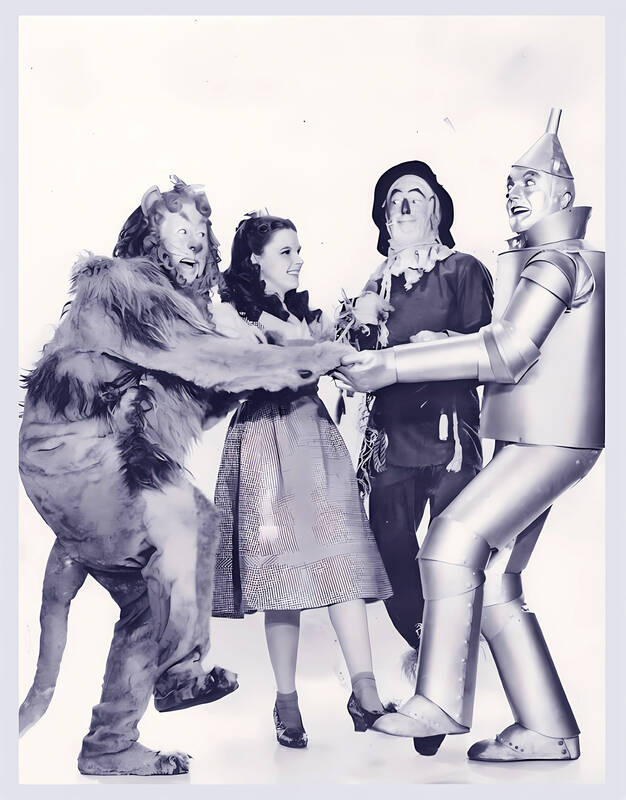對話 Dialogue
清清:華華,你知不知道「綠野仙蹤」這個童話故事?
Qīngqing: Huáhua, nǐ zhī bù zhīdào “Lǜyěxiānzōng” zhège tónghuà gùshì?

PHOTO COURTESY OF Photo courtesy of Piqsels 照片: Piqsels 提供
華華:當然啦!這是美國非常有名的文學作品,不只有故事書,還常被改編成電影、舞台劇來演出呢!
Huáhua: Dāngrán la! Zhè shì Měiguó fēicháng yǒumíng de wénxué zuòpǐn, bù zhǐyǒu gùshì shū, hái cháng bèi gǎibiān chéng diànyǐng, wǔtáijù lái yǎnchū ne!
清清:是啊!但你看過中文版的表演嗎?
Qīngqing: Shì a! Dàn nǐ kànguò Zhōngwén bǎn de biǎoyǎn ma?
華華:沒有欸!好難想像桃樂絲和稻草人說中文會是什麼樣子。
Huáhua: Méiyǒu ei! Hǎo nán xiǎngxiàng Táolèsī hàn Dàocǎorén shuō Zhōngwén huì shì shénme yàngzi.
清清:這禮拜在台中國家歌劇院就可以看到喔!有沒有興趣跟我一起去?
Qīngqing: Zhè lǐbài zài Táizhōng Guójiā Gējùyuàn jiù kěyǐ kàndào o! Yǒu méiyǒu xìngqù gēn wǒ yìqǐ qù?
華華:好啊!台中國家歌劇院是台中的文化地標,我還沒拜訪過,剛好可以去朝聖。
Huáhua: Hǎo a! Táizhōng Guójiā Gējùyuàn shì Táizhōng de wénhuà dìbiāo, wǒ hái méi bàifǎng guò, gānghǎo kěyǐ qù cháoshèng.
清清:那我趕快來看看音樂劇的票賣完了沒?還有的話就直接訂了喔!
Qīngqing: Nà wǒ gǎnkuài lái kànkan yīnyuèjù de piào màiwánle méi? háiyǒu dehuà jiù zhíjiē dìngle o!
華華:沒問題,麻煩你了,謝謝。
Huáhua: Méi wèntí, máfán nǐ le, xièxie.
翻譯 Translation
Qingqing: Huahua, do you know the fairy tale The Wizard of Oz?
Huahua: Of course. It’s a very famous American literary work. It’s not only a storybook but also often adapted into movies and stage plays.
Qingqing: Yes, but have you ever seen a Chinese version of the performance?
Huahua: No, I haven’t. It’s hard to imagine Dorothy and the Scarecrow speaking Chinese.
Qingqing: You can see it this week at the Taichung National Theater. Are you interested in going with me?
Huahua: Sure. The Taichung National Theater is a cultural landmark in Taichung, and I haven’t visited it yet. It would be a great opportunity to check it out.
Qingqing: Let me quickly check if tickets are still available. If they are, I’ll book them right away.
Huahua: No problem, thank you.
生詞 Vocabulary
1. 音樂劇 (yīnyuèjù) musical, musical theater
2. 童話 (tónghuà) fairy tale
3. 文學作品 (wénxué zuòpǐn) literary work
4. 改編 (gǎibiān) adaptation, remake
5. 稻草人 (dàocǎorén) scarecrow
6. 地標 (dìbiāo) landmark
7. 拜訪 (bàifǎng) visit
8. 朝聖 (cháoshèng) pilgrimage
教材音檔 Audio Files
國立清華大學華語中心提供
By National Tsing Hua University Chinese Language Center:

In an effort to fight phone scams, British mobile phone company O2 has introduced Daisy, an AI designed to engage phone con artists in time-wasting conversations. Daisy is portrayed as a kindly British granny, exploiting scammers’ tendency to target the elderly. Her voice, based on a real grandmother’s for authenticity, adds to her credibility in the role. “O2” has distributed several dedicated phone numbers online to direct scammers to Daisy instead of actual customers. When Daisy receives a call, she translates the scammers’ spoken words into text and then responds to them accordingly through a text-to-speech system. Remarkably, Daisy

Bilingual Story is a fictionalized account. 雙語故事部分內容純屬虛構。 Emma had reviewed 41 resumes that morning. While the ATS screened out 288 unqualified, she screened for AI slop. She could spot it a mile away. She muttered AI buzzwords like curses under her breath. “Team player.” “Results-driven.” “Stakeholder alignment.” “Leveraging core competencies.” Each resume reeked of AI modeling: a cemetery of cliches, tombstones of personality. AI wasn’t just changing hiring. It was draining the humanity from it. Then she found it: a plain PDF cover letter. No template. No design flourishes. The first line read: “I once tried to automate my

Every May 1, Hawaii comes alive with Lei Day, a festival celebrating the rich culture and spirit of the islands. Initiated in 1927 by the poet Don Blanding, Lei Day began as a tribute to the Hawaiian custom of making and wearing leis. The idea was quickly adopted and officially recognized as a holiday in 1929, and leis have since become a symbol of local pride and cultural preservation. In Hawaiian culture, leis are more than decorative garlands made from flowers, shells or feathers. For Hawaiians, giving a lei is as natural as saying “aloha.” It shows love and

1. 他走出門,左右看一下,就過了馬路。 ˇ He walked outside, looked left and right, and crossed the road. χ He walked outside and looked left and right, crossed the road. 註︰並列連接詞 and 在這句中連接三個述語。一般的結構是 x, y, and z。x and y and z 是加強語氣的結構,x and y, z 則不可以。 2. 他們知道自己的弱點以及如何趕上其他競爭者。 ˇ They saw where their weak points lay and how they could catch up with the other competitors. χ They saw where their weak points lay and how to catch up with the other competitors. 註:and 一般連接同等成分,結構相等的單詞、片語或子句。誤句中 and 的前面是子句,後面是不定詞片語,不能用 and 連接,必須把不定詞片語改為子句,and 前後的結構才相等。 3. 她坐上計程車,直接到機場。 ˇ She took a cab, which took her straight to the airport. ˇ She took a cab and it took her straight